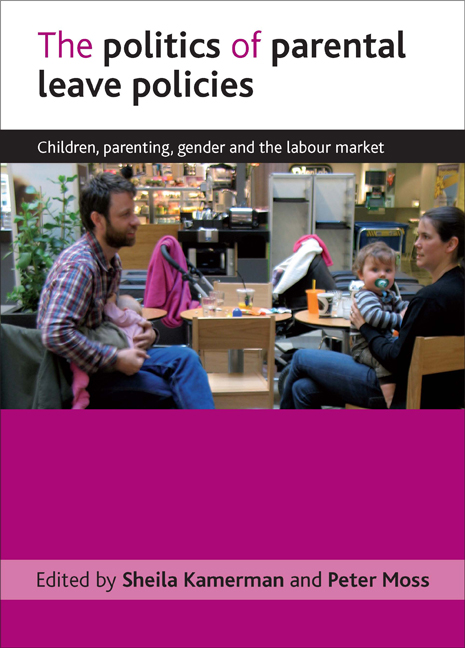Book contents
- Frontmatter
- Contents
- List of tables and figures
- Acknowledgements
- Notes on contributors
- one Introduction
- two Australia: the difficult birth of paid maternity leave
- three Canada and Québec: two policies, one country
- four Czech Republic: normative or choice-oriented system?
- five Estonia: halfway from the Soviet Union to the Nordic countries
- six Finland: negotiating tripartite compromises
- seven France: gender equality a pipe dream?
- eight Germany: taking a Nordic turn?
- nine Hungary and Slovenia: long leave or short?
- ten Iceland: from reluctance to fast-track engineering
- eleven The Netherlands: bridging labour and care
- twelve Norway: the making of the father’s quota
- thirteen Portugal and Spain: two pathways in Southern Europe
- fourteen Sweden: individualisation or free choice in parental leave?
- fifteen The European directive: making supra-national parental leave policy
- sixteen Conclusion
- Appendix
- Index
seven - France: gender equality a pipe dream?
Published online by Cambridge University Press: 05 July 2022
- Frontmatter
- Contents
- List of tables and figures
- Acknowledgements
- Notes on contributors
- one Introduction
- two Australia: the difficult birth of paid maternity leave
- three Canada and Québec: two policies, one country
- four Czech Republic: normative or choice-oriented system?
- five Estonia: halfway from the Soviet Union to the Nordic countries
- six Finland: negotiating tripartite compromises
- seven France: gender equality a pipe dream?
- eight Germany: taking a Nordic turn?
- nine Hungary and Slovenia: long leave or short?
- ten Iceland: from reluctance to fast-track engineering
- eleven The Netherlands: bridging labour and care
- twelve Norway: the making of the father’s quota
- thirteen Portugal and Spain: two pathways in Southern Europe
- fourteen Sweden: individualisation or free choice in parental leave?
- fifteen The European directive: making supra-national parental leave policy
- sixteen Conclusion
- Appendix
- Index
Summary
Maternity leave: 16 weeks at 100% of earnings, up to a ceiling of €2,773 a month (24 weeks for third or further child).
Paternity leave: 2 weeks provided by two schemes – 3 working days at 100% of earnings, paid by the employer), and 11 consecutive days (including non-working days) at 100% of earnings, up to a ceiling of €2,773 a month, paid by the social security fund.
Parental leave: until the child is 3 years; family entitlement. A flat-rate payment (€536 per month) is paid to families with a parent not working – whether taking leave or not – whose income is below a certain level (in practice, about 90% of families are eligible). However, for parents with only one child, it is only paid until 6 months after the end of maternity leave; in other families, it is paid until the child reaches 3 years of age. Parents working part time up to 32 hours per week may receive the benefit at a reduced amount.
Leave to care for sick children: unpaid leave for parents of children under 16 years; legally, periods of leave cannot exceed 3 days (or 5 days if a child is under one year old or if there are 3 children or more), but this is a minimum and most collective agreements have special arrangements, as in the public sector where employees can take 14 days a year to care for a sick child. In cases of a serious disability or illness of a child under 20 years, every employee with at least one year of employment with an employer is entitled to paid leave to care for her/his child, or to work part time for a period of up to 3 years (the allowance is paid for a maximum of 310 working days, that is, around 14 months, within a period of 3 years). The level of the allowance depends on the duration of work for the employer and on the family structure (for example, if one parent in a couple family stops work, the amount is €39.58 per day; €47.02 for a lone parent). A similar period of leave is possible for employees who need to care for a relative at the end of life, either a child or a parent living in the same house.
Other: none.
- Type
- Chapter
- Information
- The Politics of Parental Leave PoliciesChildren, Parenting, Gender and the Labour Market, pp. 103 - 118Publisher: Bristol University PressPrint publication year: 2009
- 1
- Cited by



